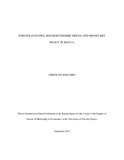| dc.description.abstract | The thesis focuses on short term capital flows in Kenya. It seeks to contribute to current body of
knowledge and research on capital flows by investigating the effect of short term capital flows
on macroeconomic prices and on the conduct of monetary policy management in an emerging
market such as Kenya. Empirical analysis is carried out to determine: the impact of short term
capital flows on stock market performance, the impact of short term capital flows on interest rate
and exchange rate, and the effect of short term capital flows on monetary policy and estimation
of monetary policy reaction function. The first empirical section focuses specifically on
portfolio flows to the stock market where a multifactor pricing model is employed using the
stock market return to proxy for stock market performance. In the second section, a structural
vector autoregressive (SV AR) approach is used, while in the last section, a monetary policy rule
is estimated using a Generalised Method of Moments (GMM) approach. The thesis use monthly
data from April 1996 to December 2011.
The results underscore the importance of short term capital flows to the emerging markets. We
find that participation of foreign investors If~;";n effect on domestic stock market returns and
that stock market return is affected by lagged unexpected flows and not by its contemporaneous
value. The price pressure hypothesis is supported but only weakly, with security prices revised
downwards with a lag. The base-broadening hypothesis also exists, hence, the amount of foreign
investment in the market drives up returns arid hence performance of' the market. Flows by
intemal investors are important in determining stock market returns. We also find that active
participation of local investors has a positive impact on returns. Macroeconomic factors,
especially the change in exchange rate and Treasury bill rate, are important in determining
returns. Stability of exchange rate is therefore important for stock market performance. The
expected portfolio flows show a positive and significant relationship to stock market returns,
implying that increase in expected portfolio flows will stimulate market performance as it creates
confidence among investors in the market.
Increased short term flows affect monetary stability by reducingthe interest rates over time and
leads to currency appreciation. Despite the appreciation, short term capital flows has no
significant effect on the exchange market pressure, which may be due to low levels of short term
capital flows. We also find the exchange market pressure to be mainly affected by changes in
v
exchange rate and not by short term flows. This underscores the role of official foreign
exchange reserves in addressing any instability in the foreign exchange market as reserves act as
buffers.
In the interest rate rule, we find that the central bank adjusts the bank rate to accommodate
changes in the economy to ensure that inflation is restored to the targeted level. However, the
role of ensuring growth targets are met is given prominence in the monetary policy rule. We also
find that monetary authorities always ensure that changes in the interest rates do not affect the
macroeconomic activity given the level of the smoothing parameter. Consideration of exchange
rate in the monetary policy rule results in the increase of the bank rate to macroeconomic
changes, however inflation is not significant in the monetary policy rule.
The results suggest that despite the role of short term flows in lowering the cost of capital and
financing growth, they have a disruptive effect on macroeconomic prices. Hence, to maintain
stability in the economy and effectively manage monetary policy, capital flows should be
considered, especially given the effect it has on interest rates and exchange rate. The implication
-; ;
is that monetary policy should take into .t-q,nsideration short term capital flows, through
observation of the change in exchange rate when considering monetary policy decisions. Thus
the bank rate will be adjusted with a higher magnitude to address the effect of exchange rate
change. | en |

